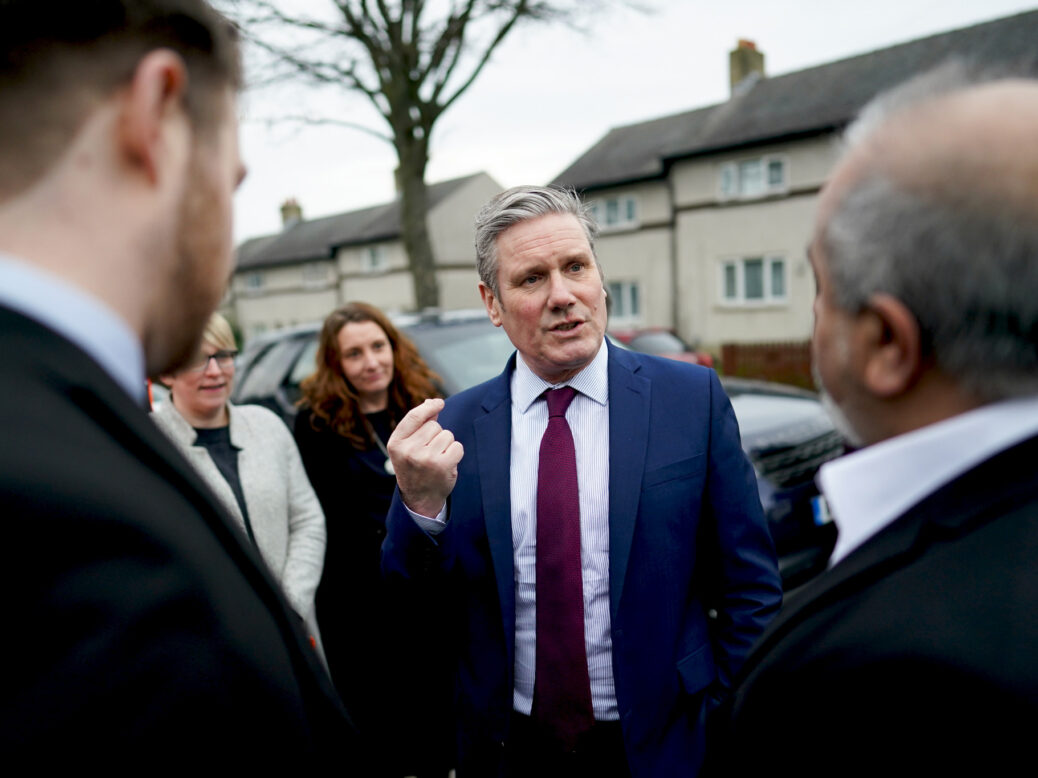
Is Labour due a shock with Muslim voters over its stance on Gaza? It has certainly lost out before with this demographic: think of the Tower Hamlets mayoral election in 2022 (losing to Lutfur Rahman’s Aspire party), the Bradford West by-election in 2012 (won by George Galloway), and the Bethnal Green and Bow seat in 2005 (also won by Galloway). Britain’s Muslims are not definitely for Labour, though almost every ward and seat in England and Wales with a large Muslim population is now either represented by a Labour MP or a Labour councillor.
My own data suggests that in 2017 not one majority Muslim neighbourhood voted in plurality or majority terms for anyone but its Labour parliamentary candidate. In 2019 it was 97 per cent. However, in recent council elections, that figure dropped further to 88 per cent. Local elections are not general elections, but this represents the most marked difference between local and general results among this demographic, as the chart below shows.
Historically, Britain’s Muslims have voted for parties other than Labour. The Iraq War shifted many votes in 2005, benefiting the Lib Dems and that Scottish fella in a fedora. And now, as Labour is criticised by senior party figures for refusing to back a ceasefire in Gaza, and with more than 20 councillors having resigned over the issue, is it facing a new revolt at the ballot box?
[See also: Will Labour unity break over the Israel-Hamas war?]
The short answer is that, yes, Labour’s prevarications might start something. But I want you to stay for the longer, more definitive, answer.
Britain’s Muslims are not a homogeneous group of voters concerned by the Middle East and little else. Such an assumption is rather insulting, and also divorced from reality. Because for every stratum of society, including Britain’s four million Muslims, the cost of living trumps all other concerns at the moment. If this subject wasn’t so dominant, outrage over Gaza, immigration or another issue may have been more intense than it is.
But this isn’t to say that there won’t be any backlash against Labour from some Muslims, or that the current crisis in Gaza won’t lead to long-term apathy and voter defections. The question for Labour is: where should it fear a challenge and from whom? Should we prepare for the return of Galloway’s Respect? (Or something like it.) Will the Liberal Democrats profit from this sort of discontentment again? The data shows there is Lib Dem strength in majority Muslim wards, but that this is largely reserved to old stomping grounds such as Birmingham Yardley and Perry Barr.
Focusing on Labour’s old challengers in Muslim Britain only tells part of the story. Labour had a bad year in 2021. At the local elections, the party endured a repeat of its December 2019 rout under Jeremy Corbyn. And in certain parts of England, the Tories scored surprise wins in areas with large Muslim populations, electing Conservative councillors for the first time since… well, since there wasn’t a large Muslim population.
Those results suggested two things. First, that Labour’s base was apathetic and unwilling to turn out (remember the Tories’ vaccine bounce?), allowing Conservative candidates to appeal to those still engaged with the democratic process. Second, something that is harder for some to grasp: Conservative candidates – and the Conservative brand – aren’t as toxic with Muslim voters as they once were.
In May this year, after serious strife within the Labour constituency group, Leicester Labour suffered sizeable losses at the local elections to the Tories’ gain. The Conservatives went from zero seats on the council in 2019 to 17, winning wards they hadn’t taken in decades. Labour, meanwhile, fell from 53 (of a possible 54 seats) to 31. North Evington, which is 40 per cent Muslim, went Tory.
And this was not an isolated example. In north Lancashire, in Pendle and Clitheroe, one ward, which is 54 per cent Muslim, went Labour in 2017 but Tory in 2019 and Tory again in 2023. Accrington’s town centre, two thirds Muslim as of the last census, voted in a Tory councillor in May and went for the Tory MP Sara Britcliffe in 2019.
If there is marked disaffection with Labour over Palestine from Muslim voters, defectors won’t necessarily head in the same direction. In the 2005 general eleciton some went Lib Dem. In the 2021 locals, some of them stayed at home. And perhaps most importantly, 2022-23 showed that some are even content to go Conservative.
[See also: Keir Starmer has lost control of Labour's message on Gaza]




